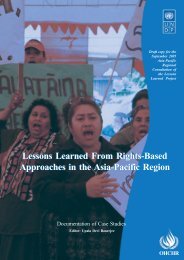View / Download - HRBA Portal
View / Download - HRBA Portal
View / Download - HRBA Portal
Create successful ePaper yourself
Turn your PDF publications into a flip-book with our unique Google optimized e-Paper software.
Participation of the disabled population in elections in AfghanistanWomen in Afghanistan are usually confined to theirhomes and have limited access to the public sphere.It is small wonder then that women with disabilitiesdo not have access and thus do not reflect on issuesthat are related to access. Almost a third of therespondents of the ADU survey in Kabul, most ofwhom were of course women, reported that thequestion on accessibility did not apply to them. 12 Theoverall condition in rural areas is understood to bemuch worse.Preference falsification ornaïveté?Another interesting revelation evident in oursurvey is a disparity between some of the problemsand causes identified. This disparity, by implication,must impact the nature of remedies sought. Forinstance, and this is repeatedly evident, a problemreported by interviewees is the neglectful andcontemptuous attitude shown towards them bysociety and the government. But when asked“What do you think are some of the specific causesbehind those difficulties?” the same intervieweesreplied that economic conditions and joblessnesswere among the causes for the difficulties theyexperienced. This begs the question: will simplyimproving economic conditions and providingjobs really help alleviate the attitudinal hostilityshown towards persons with disabilities and, ineffect, end the discrimination they encounter insociety?Clearly, the causes and implied solutions are notgermane to the problems. But why this disparity? Itseems there can be two possible answers to this.The first one is simple. The respondents, in theirnaïveté, have misconstrued the problem andmisidentified the underlying causes. But how canthis be? How can so many people be so naïve?Doesn’t such a conclusion go against the receivedwisdom of participatory research? After all, it is thevictims who are expected to have a better insightto their plight rather than independent, outsideobservers.This brings us to the other possible explanation.Could it be that there is something preventing therespondents from revealing their true wishes? Thepossibility of such a paradoxical situation isexplained in behavioural economics by theinsightful term “preference falsification”. 13 What itmeans is that because of, among others, grouppressures and fear of social sanction or reprisal, thepolicy preferences that people express in publicoften differ from those they hold privately. Thus,people rely on the prevailing climate of opinionwhen developing their personal belief systems thatunderpin their policy choices and preferences.In the case of a person with disability fromthe marginalized sections in Afghanistan, theprevailing climate of opinion is one of contempt,ridicule and neglect towards the disabled. Andbecause the victims of such practices haveinternalized discrimination all their lives, they tendto deemphasize the attitudinal hostility, which isreal or at least the preeminent cause of problems,and, instead, emphasize other issues, such aseconomics. That is not to suggest that economicissues are not relevant. The point is that solutionspremised on economic aspects alone or evenprimarily will fall short of solving the problems.11 Afghan Disabled Union, op. cit., 2004.12 Ibid.13 Timur Kuran, Private Truths, Public Lies: The Social Consequences of Preference Falsification, Harvard University Press.21



